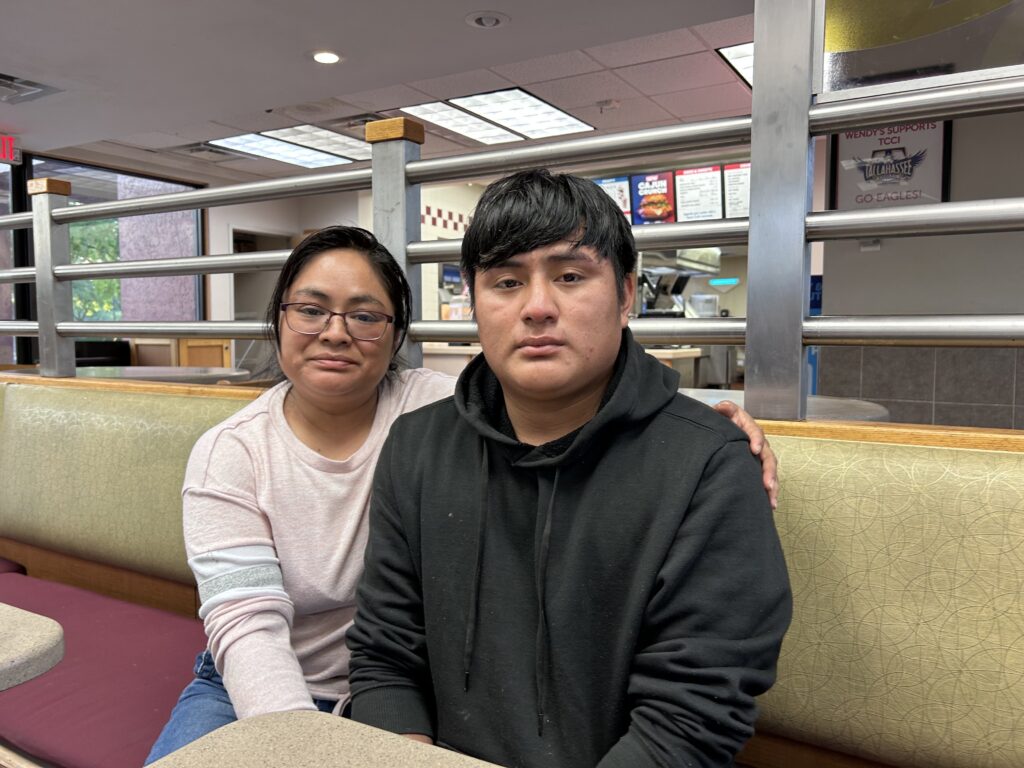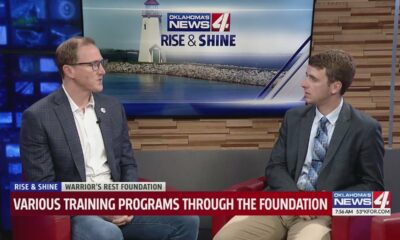News from the South - Florida News Feed
SC doctors seek conscience protections to provide abortion care in new federal lawsuit • Florida Phoenix

SC doctors seek conscience protections to provide abortion care in new federal lawsuit
by Sofia Resnick, Florida Phoenix
February 8, 2025
About three months into conceiving their second child last fall, the young South Carolina couple was given an earth-shattering prognosis. And two grim choices.
Based on multiple genetic tests and an ultrasound that indicated the baby was not growing normally, a maternal-fetal medicine specialist suspected triploidy, a deadly genetic disorder in which chromosomes are tripled rather than doubled. The couple could wait for their daughter to die in utero or within minutes or hours of being born. Or they could terminate.
But because of a nascent law in South Carolina — which bans pregnancy termination if cardiac activity is detectable on an ultrasound — the couple now had to prove their baby’s condition was fatal in order to qualify for an abortion under the state’s limited exceptions.
The mom, who asked to withhold her name to protect her family’s privacy, said cardiac activity was still audible but the pregnancy was so underdeveloped, the medical team could not extract a sample from the placenta. And when they began debating whether to pull down her uterus, the mom said she and her husband decided to leave the state. Their doctor connected them with a hospital in Virginia, where abortion is legal.
“I feel discouraged from ever trying to do this again,” said the mom, who told States Newsroom that she and her husband wanted the abortion so she could start grieving her lost child and ensure her own health. “I love being a mom. I want kids. I have a beautiful child. But if something like this ever happens to me again, it’s not going to be better, but it could be a lot worse in this new political climate.”
For some OB-GYNs in South Carolina, denying care to pregnant patients has become a devastating new part of their job. In a first-of-its-kind lawsuit with national implications, a group of OB-GYNs is asking a federal court to overturn the state’s abortion ban on the basis that it does not allow “physicians to provide abortion care mandated by their religious beliefs.”
“Most people go into medicine to provide care and feel very strongly about that, particularly in the field that they have expertise. But as human beings, we also have a conscience and religious beliefs that sustain and nurture what we do in our professional realm,” said Dr. Natalie Dawn Bingham, an OB-GYN who practices in Columbia and who serves as an elder at First Presbyterian Church in Spartanburg.
She is the lead plaintiff among five doctors who say the state abortion law’s exceptions violate the First Amendment’s due process clause for being too vague and violate the free exercise clause. Passed in 2023, the state’s so-called “fetal heartbeat” law effectively bans abortion around six weeks’ gestation, before many women first learn they are pregnant.
(In a separate state lawsuit, Planned Parenthood argues the law should actually allow abortions through the ninth week.)
Like similar legislation enacted in Florida, Georgia, and Iowa, South Carolina’s law has exceptions for fatal fetal illnesses and if the pregnant person is in danger of death or an “irreversible physical impairment.”
Poorly defined
Bingham, who has been practicing in the state since 2005, said these exceptions are poorly defined and difficult to qualify for, sparking debates about whether a fetus destined to die within hours or days of birth still constitutes as having a fatal condition, or whether a maternal diagnosis of cancer or severe hypertension would qualify as a medical emergency. She said the state has turned what were previously medical questions into legal ones, the possible consequences of which include losing one’s medical license, a $10,000 fine, and two years in prison.
To comply with the law, doctors have to report abortions provided under the exceptions and maintain related records for seven years, and they have to provide detailed medical documentation that supports the diagnosis of a fatal fetal anomaly. According to the lawsuit, some of the hospitals where plaintiffs work require consensus from multiple physicians, and many worry their judgment could be later second-guessed by prosecutors or medical board members.
“How can you say that you could access these exceptions based on reasonable medical judgment when you already are not respecting the medical judgment of the people making these decisions?” said Bingham, who like the other OB-GYN plaintiffs in the case works with high-risk patients. “Down the line, at any point in time, some arbitrary prosecutor could call that into question, who doesn’t have any medical training.”
In cases of rape or incest, abortion is legal up to 12 weeks’ gestation. The law requires that a doctor tell the patient that a police report must be filed within 24 hours of the abortion. “In a rare instance in which a rape survivor was willing to report the rape to law enforcement, the police insisted on coming to her home to complete the report,” the complaint reads. “The experience was so degrading that the patient permanently left South Carolina.”
The lawsuit also notes that the 12-week limit further precludes rape and incest survivors from accessing abortion under these exemptions because many survivors are children or teenagers and often don’t discover they are pregnant until later. From the law’s effective date in August 2023 through December 2023, fewer than five abortions were provided under the rape or incest exception, according to state health data.
Bingham said the only pediatric and adolescent OB-GYN moved to Virginia over legal issues.
An emerging legal strategy
During his recent confirmation hearing before the U.S. Senate Committee on Finance, Health and Human Services secretary nominee Robert F. Kennedy Jr. agreed when asked by U.S. Sen. James Lankford, R-Oklahoma, if he supported conscience protections for anti-abortion health professionals.
“Forcing somebody to participate in a medical procedure as a provider that they believe is murder does not make any sense to me,” Kennedy replied.
Despite implications to the contrary, there are several federal laws that allow providers to opt out of abortion, including the Weldon Amendment, named after Dave Weldon, President Donald Trump’s nominee to head the U.S. Centers for Disease Control and Prevention.
In recent years, anti-abortion groups have successfully used religious freedom laws as arguments against having to provide or refer for contraception. In 2014 the U.S. Supreme Court ruled in Burwell v. Hobby Lobby Stores Inc., that the birth control coverage mandate in the Affordable Care Act violated the religious rights of for-profit corporate owners. In 2020’s Little Sisters of the Poor Saints Peter and Paul Home v. Pennsylvania decision, the Supreme Court upheld the Trump administration’s regulations allowing employers with religious or moral objections to opt out of providing contraceptive coverage to employees.
Filed last month, Bingham v. Wilson is one of the first federal cases to look at doctors’ religious and conscience rights from an abortion-rights perspective.
At a conference of OB-GYNs about 18 months ago, Bingham said she and other physicians began discussing their legal options.
“If there is a right to refuse care, there certainly seems to be the corollary where we have a right to provide care, particularly based on our conscience, and then the tenets of each of our own religions, and based on years of training and dedication,” Bingham said, noting that South Carolina has a conscience law that allows health providers to refuse care.
Her co-plaintiffs include complex family planning specialist and Incarnation Lutheran Church member Dr. Patricia Seal, complex family planning specialist Dr. Jessica Tarleton of Christian and Jewish faith, OB-GYN Dr. Katee Wyant, and an anonymous complex family planning specialist known as Jane Doe. They are represented by the Lawyering Project and the Law Office of Bill Nettles.
‘Cherished beliefs’
“For these five physicians it’s almost every day that they are setting aside their most cherished beliefs,” said Rupali Sharma, founder of and senior counsel at the Lawyering Project. “Their faith commands them to place others before themselves, and so when they don’t provide abortion care to someone who could now suffer long-term debilitating physical or mental health consequences, they feel like they’re putting their license, their families, their freedom from imprisonment above that patient, and that too was something that these physicians just cannot abide by.”
In the lawsuit, the plaintiffs ask for the law to be overturned or at least clarified to require law enforcement to defer to a woman’s doctor in the cases excepted under the law. They argue the law discriminates by allowing for some secular exceptions but not religious ones.
“South Carolina’s Abortion Ban is neither religiously neutral nor generally applicable,” the complaint reads. “It allows people to terminate potential life for a wide variety of secular purposes. These allowances undermine South Carolina’s purported interest in criminalizing the termination of potential life as much as abortion care compelled by Plaintiffs’ deeply held beliefs would.”
Sharma said that before the 2022 Dobbs decision, the Lawyering Project argued that an Indiana restriction requiring abortion clinics to bury or cremate the remains from all abortions and miscarriages violated the free exercise clause. They successfully blocked the law until 2023, when the injunction was suspended.
Since then, religious progressives have challenged abortion bans in Florida, Indiana, and Kentucky using arguments that their faith compels them to obtain abortions in certain circumstances. The lawsuits in Florida and Kentucky were dismissed for lack of standing while litigation continues in Indiana.
Religious obligation
Abortion-law expert Mary Ziegler said that unlike these state lawsuits, the South Carolina doctors might have a better claim of standing because they can cite direct harm, as they’re prohibited from providing care their religion would mandate. But she said that while legal scholarship has grown around the secular versus religious exceptions argument, the legal theory has rarely been tested in court. The University of California Davis law professor noted that in the 2014 Hobby Lobby decision the plaintiffs were granted relief even though they weren’t directly administering care.
“It wasn’t like the employer in Hobby Lobby was giving people birth control. There were lots of other steps along the way, whereas in this case the physicians are arguing that they are … not intervening when they feel religiously obligated to,” Ziegler said.
In some of these abortion-rights religious freedom cases, the challenged states have cast doubt on plaintiffs’ sincere religious beliefs.
Sharma says to doubt the religious and conscientious beliefs of her clients is not to understand their jobs.
“It’s about when you see suffering and you’re empowered to stop it, you stop it, right?” Sharma said. “And the idea that these things wouldn’t be central to most faiths, is kind of astounding to me. Of course, abortion and religion are interlinked, because abortion for many people and religion for many people is about you mattering and your life mattering and your family mattering, and being able to preserve those things and protect those things.”
YOU MAKE OUR WORK POSSIBLE.
Florida Phoenix is part of States Newsroom, a nonprofit news network supported by grants and a coalition of donors as a 501c(3) public charity. Florida Phoenix maintains editorial independence. Contact Editor Michael Moline for questions: info@floridaphoenix.com.
News from the South - Florida News Feed
U.S. small manufacturers hope to benefit from tariffs, but some worry about uncertainty

SUMMARY: Drew Greenblatt, president of Marlin Steel Wire Products, supports the Trump administration’s tariffs aimed at rebalancing trade in favor of U.S. manufacturers. He believes overseas competitors have unfair advantages, creating an uneven playing field for American workers. The administration seeks to revitalize U.S. manufacturing, which has declined by 35% since 1979, by imposing tariffs to encourage local production. However, some small manufacturers, like Corry Blanc and Michael Lyons, express concerns about the resulting economic uncertainty and potential recession. In contrast, Bayard Winthrop of American Giant remains hopeful that tariffs will lead to a resurgence of American-made products.
The post U.S. small manufacturers hope to benefit from tariffs, but some worry about uncertainty appeared first on www.clickorlando.com
News from the South - Florida News Feed
JD Vance goes to the Vatican following remarkable papal rebuke over Trump crackdown on migrants

SUMMARY: U.S. Vice President JD Vance is meeting Vatican Secretary of State Cardinal Pietro Parolin after a papal rebuke of the Trump administration’s immigration policies. Vance, a Catholic convert, has defended these policies through medieval Catholic theology concepts, which Pope Francis directly criticized. The Pope advocates for broader compassion toward migrants, contrasting Vance’s more hierarchical view of care. While in Rome for Easter, Vance attended Good Friday services at St. Peter’s Basilica with his family. He has previously criticized Francis but recently expressed prayers for the Pope’s recovery, highlighting the complex relationship between them on issues of social justice and migration.
The post JD Vance goes to the Vatican following remarkable papal rebuke over Trump crackdown on migrants appeared first on www.news4jax.com
News from the South - Florida News Feed
Federal judge extends block on Florida immigration law that led to arrest of a U.S. citizen

by Jackie Llanos, Florida Phoenix
April 18, 2025
A federal judge brought up the arrest in Leon County of Juan Carlos Lopez-Gomez, a U.S. citizen born in Georgia, during a hearing Friday in which she extended her block of the new Florida immigration law until April 29.
U.S. District Court Judge Kathleen Williams expressed frustration about the arrests of Lopez-Gomez and others, said an attorney representing the immigrants and groups suing the state.
At issue is Williams’ April 4 order temporarily barring enforcement of a law passed during a special session earlier this year making it a first-degree misdemeanor to illegally enter the state as an “unauthorized alien.”
A Florida Highway Patrol trooper’s arrest of Lopez-Gomez on Wednesday prompted national attention following Florida Phoenix’s reports that he was set to remain in jail because U.S. Immigration and Customs Enforcement had placed a 48-hour hold on him — even after a Leon County judge determined there had been no probable cause for the arrest.
Lopez-Gomez was released from Leon County jail on Thursday evening. The 20-year-old held his mother in a tight embrace and wept when they reunited.
“We appreciate that the federal courts have seen through this blatantly unconstitutional law, but the reality is that, without enforcement, it seems that local law enforcement and Florida Highway Patrol are continuing to ignore the judge and order,” said Miriam Fahsi Haskell, an attorney for Community Justice Project representing the plaintiffs, in a phone interview with the Phoenix. “The reality is that once a person is arrested under SB 4C and booked into jail, that person risks then having an ICE hold on them.”
Community Justice Project, the ACLU of Florida, Americans for Immigrant Justice, and Florida Legal Services attorneys are representing the plaintiffs: the Florida Immigrant Coalition, Farmworker Association of Florida Inc., and two women without permanent legal status.
David Matthew Costello, lead attorney representing Attorney General James Uthmeier, declined to comment, and a spokesperson for the attorney general’s office did not respond to the Phoenix’s questions. The other defendants are the statewide prosecutor and state attorneys.
Binding?
During the hearing at the U.S. District Court of the Southern District of Florida in Miami, attorneys representing the state argued that law enforcement is not bound by Williams’ order, Fahsi Haskell said. Another hearing is set for April 29.
“The Court enters a [temporary restraining order] prohibiting Defendants and their officers, agents, employees, attorneys, and any person who are in active concert or participation with them from enforcing SB 4-C,” Williams’ order states.
Two other men were with Lopez-Gomez when the trooper stopped the car because the driver was going 78 mph in a 65 mph zone, according to the arrest report. The driver, Estiven Sales-Perez, and another passenger, Ismael Sales-Luis, were also charged with illegal entry as “unauthorized aliens.” The driver was also charged with driving without a license.
ICE has taken custody of Sales-Perez and is holding him in a Tallahassee field office, according to the online detainee locator system.
“Florida Highway Patrol will continue to work willingly with our federal partners to engage in interior enforcement of immigration law,” a spokesperson for the agency wrote in a statement to the Phoenix.
Florida Democratic Party Chair Nikki Fried called the arrest a kidnapping.
“Where does the lawlessness of this administration stop? If this can happen to an American-born citizen, it can happen to any of us,” she said in a statement.
YOU MAKE OUR WORK POSSIBLE.
Florida Phoenix is part of States Newsroom, a nonprofit news network supported by grants and a coalition of donors as a 501c(3) public charity. Florida Phoenix maintains editorial independence. Contact Editor Michael Moline for questions: info@floridaphoenix.com.
The post Federal judge extends block on Florida immigration law that led to arrest of a U.S. citizen appeared first on floridaphoenix.com
-

 Mississippi Today6 days ago
Mississippi Today6 days agoLawmakers used to fail passing a budget over policy disagreement. This year, they failed over childish bickering.
-

 Mississippi Today6 days ago
Mississippi Today6 days agoOn this day in 1873, La. courthouse scene of racial carnage
-

 Local News6 days ago
Local News6 days agoSouthern Miss Professor Inducted into U.S. Hydrographer Hall of Fame
-

 News from the South - Alabama News Feed5 days ago
News from the South - Alabama News Feed5 days agoFoley man wins Race to the Finish as Kyle Larson gets first win of 2025 Xfinity Series at Bristol
-

 News from the South - Alabama News Feed5 days ago
News from the South - Alabama News Feed5 days agoFederal appeals court upholds ruling against Alabama panhandling laws
-

 News from the South - Florida News Feed7 days ago
News from the South - Florida News Feed7 days agoSevere weather has come and gone for Central Florida, but the rain went with it
-

 News from the South - Alabama News Feed7 days ago
News from the South - Alabama News Feed7 days agoBellingrath Gardens previews its first Chinese Lantern Festival
-

 News from the South - Texas News Feed6 days ago
News from the South - Texas News Feed6 days ago1 dead after 7 people shot during large gathering at Crosby gas station, HCSO says









































